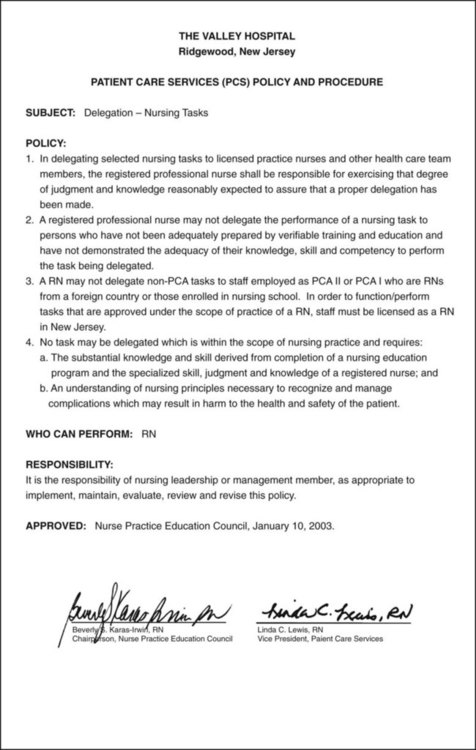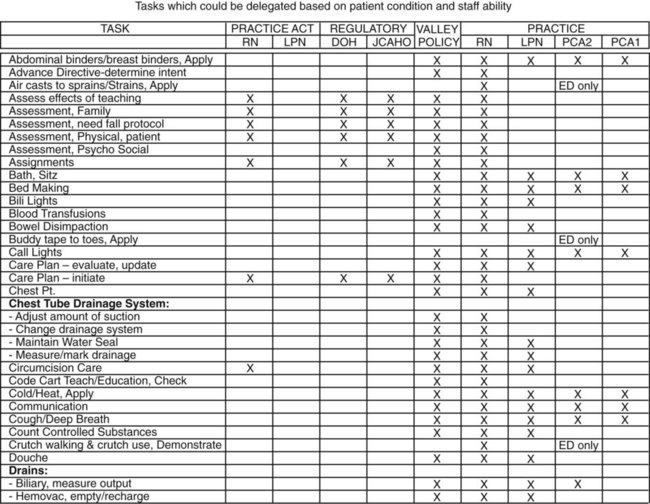2. Identify the five rights of delegation. 3. Review the circumstances where delegation is appropriate. 4. Identify tasks appropriate for delegation. 5. Discuss the role of unlicensed personnel in the delivery of health care. 6. Identify the role of the nurse in the delegation of health care. Unlicensed assistive personnel Individuals who are not licensed by the state and are trained to assist nurses by performing patient care tasks as allowed by the organization. There are many job titles for such employees, such as nursing assistant (NA), patient care associate (PCA), and unlicensed assistive personnel (UAP) Direct patient care activities Activities such as hygienic care, feeding patients, taking vital signs, and so on that are performed on the patient Delegation is defined as the “transfer of responsibility for the performance of an activity from one individual to another while retaining accountability for the outcome. Example: the nurse, in delegating an activity to an unlicensed individual, transfers the responsibility for the performance of the activity but retains professional accountability for the overall care” (ANA, 1992). It is the entrusting of a selected nursing task to an individual who is qualified, competent, and able to perform such a task. The majority of health care institutions have care delivery systems that include various levels of caregivers. The acuity of patients within hospitals has increased during the past 10 years, and many hospitals have moved from total patient care, primary care, and other care delivery systems that require an all–registered nurse staff. To meet the needs of the higher-acuity patients, nurses must delegate aspects of care to non–registered nurse team members. Delegation changes as the health care environment changes. Since the advent of the nursing shortage, unlicensed assistive personnel (UAP) have been used to help fill the workforce gaps. The role of these assistive personnel is defined by the institution that employs them and defines their practice. In addition to UAP, they are called noncredentialed assistive personnel. Individuals hired into these jobs are trained by the facility and by facility personnel and are evaluated by the facility. They may use a variety of titles, such as nursing assistant (NA), patient care associate (PCA), nursing technician, unit technician, and others (Carroll, 1998). They cannot practice nursing, and they must be directed, supervised, and evaluated by a registered nurse, who is ultimately responsible for all patient care (see Box 3-1 for the nurse’s responsibility in delegation). One form of licensed personnel, the licensed practical nurse (LPN), is used by many facilities. The LPN works under the direction and supervision of the registered nurse. Licensed personnel work according to the state board regulations (see Chapter 7), but the job descriptions will vary from institution to institution. Sample job descriptions can be obtained at the websites listed in Table 3-1. Table 3-1 The National Council of State Boards of Nursing (1997) has defined the Five Rights of Delegation, as follows: To assist you in reviewing these five rights, Box 3-2 will help you to determine if you are following these rights in your delegation (ANA and NCSBN, 2008). State boards of nursing relegate the nursing practice within each state. It is important for you to know the nurse practice act of the state in which you are practicing and to be aware of the delegation regulation within your state. In addition, most hospitals have policies that very carefully describe what nursing tasks can be delegated to whom. This is important, because you will see differing standards of delegation depending on the type of health care facility in which you practice. Many long-term care facilities assign LPNs as charge nurses, with registered nurses supervising that care. In ambulatory care settings, medical assistants play a major role in the delivery of care. Just because your institution uses patient care technicians to measure all vital signs and blood sugar levels and to make blood draws does not mean that all facilities can or do use such personnel. It is vital to know your institution’s standard on delegation and the specific job descriptions and competencies of each level of personnel with whom you will be working. A sample hospital policy on delegation is shown in Figure 3-1. The scope of practice will vary from state to state, so this will vary across the country.
Delegation of Nursing Tasks
DELEGATION

THE FIVE RIGHTS OF DELEGATION
RIGHT TASK
![]()
Stay updated, free articles. Join our Telegram channel

Full access? Get Clinical Tree


Delegation of Nursing Tasks
Get Clinical Tree app for offline access


